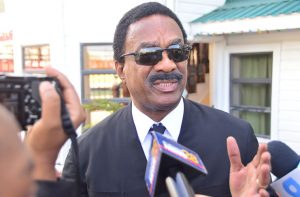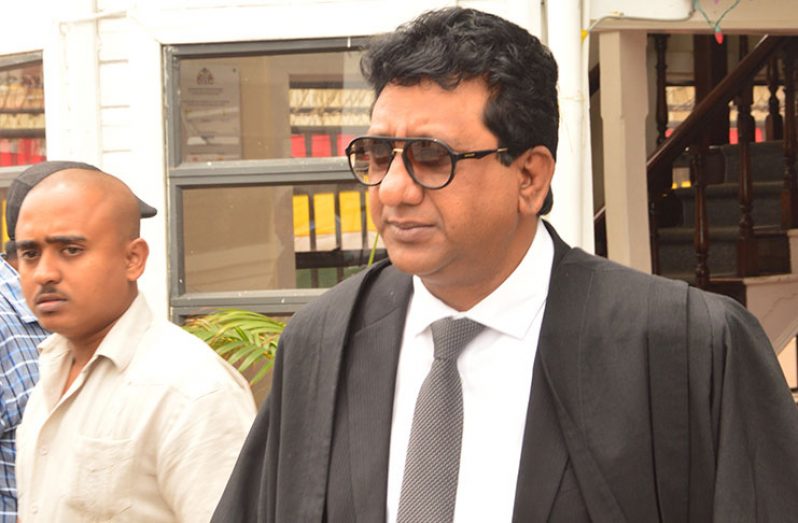…Nandlall says responsibility lies with GECOM
Attorney-at-Law Anil Nanlall on Wednesday conceded that it is the Guyana Elections Commission (GECOM) that is duly responsible for the conduct of elections.
Nandlall, the lead attorney representing the Leader of the Opposition Bharrat Jagdeo in the Court of Appeal, was among attorneys who debated the validity of the No-Confidence Motion on Wednesday as oral arguments continued in the two constitutional cases – ‘Attorney General v Christopher Ram and others,’ and ‘Attorney General v Speaker of the National Assembly and others.’
In his appearance before Chancellor of the Judiciary Yonette Cummings-Edwards and Justices of Appeal Dawn Gregory and Rishi Persaud, Nandlall, a former Attorney General, argued that Article 106 (7) of the Constitution allows for Government to remain in Office notwithstanding its defeat for the purpose of holding elections.
In laying the basis of his argument, Nandlall alluded to the ‘Explanatory Memorandum’ that accompanied Act No. 17 of 2000 which brought into effect Article 106 (6) and 106 (7). According to the Explanatory Memorandum, “Clause 5 alters 106 to provide for resignation of the Cabinet and the President following the defeat of the Government in the National Assembly on a vote of no-confidence. Although defeated, the Government shall remain in office for the holding of an election.”
However, he warned that the Constitution, in this instance, ought not to be read literally but calls for interpretation. Supporting a position long held by the Attorney General and by extension the Government, Nandlall said GECOM is constitutionally mandated to manage the conduct of elections without political interference. A literal interpretation of the Constitution, he warned, can lead to “problems.”
“The Government through the President has to fix the date for elections by way of a proclamation, and also has to dissolve Parliament, and that is what triggers the electoral machinery into action, and that is what is meant here, that is the role of Government,” Nandlall argued before a packed courtroom of lawyers and observers.
Referencing again to Article 106 (6) and Article 106 (7), Nandlall submitted that while the first article provides for the resignation of Cabinet including the President, the Government remains intact until a new president is sworn in. As such, he put to the Appellate Court that the President remains the President, and the Ministers remain Ministers of Government.
“The framers of our Constitution were so careful that they ensured that the President…remains in Office so there wouldn’t be a vacuum in the constitutional order of the executive, and only when the other president takes the oath of office, that the president and the government shall resign, so that there is a fluid transition from one executive government to another,” Nandlall explained.
With the Government in Office, he argued that the President and the Minister of Finance ought to aid in the facilitation of elections within the three month time frame or by an extended period as agreed by a two-third majority of all elected members of the National Assembly, by making the necessary financial resources available to GECOM.

Rejecting the Attorney General’s position that in the absence of Cabinet, Government cannot access finances for the management and governance of the country or the conduct of elections, Nandlall pointed the court’s attention to Articles 218, 219 and 220 of the Constitution with special focus on 220. According to Article 220 (1) “Parliament may make provision for the establishment of a Contingencies Fund and for authorising the Minister responsible for finance to make advances from that Fund if he or she is satisfied that there is an urgent need for expenditure for which no other provision exists.” Nandlall surmised that finances could be sourced from the Contingencies Fund for the holding of elections as a matter of urgency and national importance.
Majority vote
On the issue of the majority vote, as required by Article 106 (6), Nandlall submitted to the Appellate Court that a majority was acquired by the Opposition in the National Assembly on December 21, 2018 as determined by the Speaker, Dr. Barton Scotland and Chief Justice Roxane George-Wiltshire in the High Court – a position which the Attorney General and his battery of lawyers have rejected.
Nandlall recalled that in 2014, a No-Confidence Motion was laid in the National Assembly by the joint parliamentary Opposition, which held 33 seats at the time, against the then minority Government. “At that time a different Government had 32 seats, the combined opposition had 33 seats, which now form the government, and that combined opposition laid before the National Assembly a No-Confidence Motion. In a different capacity, I advised the president of the day not to go to the Parliament because of the inevitability of the defeat of the No-Confidence Motion because in a 65-seat National Assembly which we have had since Independence, a vote of one more than the other always constituted a majority,” Nandlall told the court.
Stating that Guyana does not have a specialised piece of legislation treating with parliamentary procedures, Nandlall said the country has always depended on the Standing Orders and the Constitution. According to him, in the absence of a ‘specialised piece of legislation,’ it has long been established that in the 65-seat National Assembly, 33 votes always constitute a majority.
“And it is that 33 votes that they have been able to pass every budget in the 11th Parliament and when they were in the opposition and had a joint collective of 33, they were able to defeat and cut budgetary allocations of a 32-seat Government, they were able to defeat legislation of a 32-seat Government, they were able to pass bills with their 33-seats. Not once, not once did we ever hear that 33 was not a majority,” Nandlall told the Court.
Simple majority
However, the Legal Counsel did not take into consideration during his arguments the concepts of a simple majority and an absolute majority. In the High Court it was established by attorneys on the Government side that Article 106 (6) sets out the grounds for an absolute majority which is a higher requirement. It calls for a majority of all elected members of National Assembly, and it is the belief of the Government that to arrive at an absolute majority, one must divide the number of seats by 2, round up the fraction and then add one. Such a formula in the 65-seat Assembly would result in the figure 34 and not 33. Nandlall will continue his oral submissions today at the Court of Appeal.
Outside of the Court of Appeal, the Attorney General Basil Williams, who appeared in association with Queen’s Counsel, Dr. Francis Alexis; Solicitor General, Nigel Hawke; and Attorneys-at-Law Maxwell Edwards, and Mayo Robertson, said he is pleased that Nandlall supports Government’s position that it is GECOM’s responsibility to conduct elections and not the Government. “I am happy that Mr. Nandlall has agreed with me that the Government cannot hold election that is to be undertaken by GECOM. So that is a very important admission,” the Attorney General told reporters.




.png)









